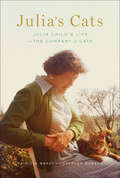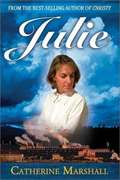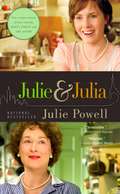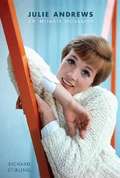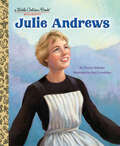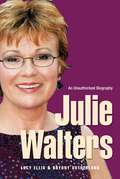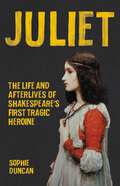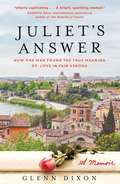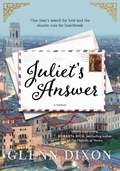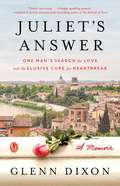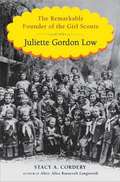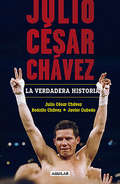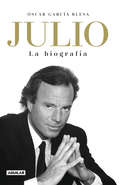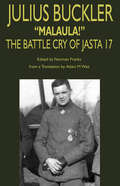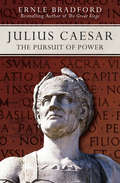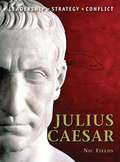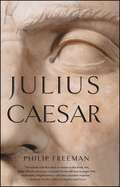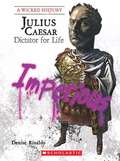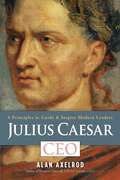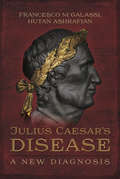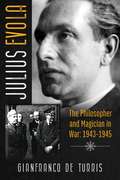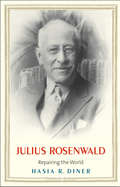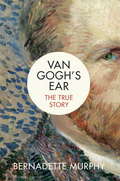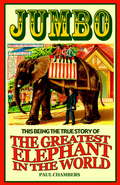- Table View
- List View
Julia's Cats: Julia Child's Life in the Company of Cats
by Patricia Barey Therese Burson“A cat-centric biography of Julia Child? Why not? . . . The many feline fanciers out there will surely enjoy the photographs of the cats.” —Chicago TribuneThe world knows Julia Child as the charismatic woman who brought French cuisine to America and became a TV sensation, but there’s one aspect of her life that’s not so familiar. Soon after the Childs arrived in Paris in 1948, a French cat appeared on their doorstep, and Julia recalled, “Our domestic circle was completed.” Minette captured Julia’s heart, igniting a lifelong passion for cats equaled only by her love of food and her husband, Paul. All the cherished feline companions who shared Julia’s life—in Paris, Provence, and finally California—reminded her of that magical time in Paris when her life changed forever.From Julia’s and Paul’s letters and original interviews with those who knew her best, Patricia Barey and Therese Burson have gathered fresh stories and images that offer a delightfully intimate view of a beloved icon.“It’s clear that all the cats that passed through her life gave her joy and comfort, probably in ways that food and even Paul could not. Having that perspective of this grande dame makes her seem all the more human and wonderfully admirable to me.” —Epicurious“This compact, entertaining read is filled with personal photos and letters that document the role cats played in Julia’s life as she moved from Paris to Provence, Cambridge to California.” —Shelf Awareness“Brings this little known aspect of Julia Child’s life to light in an engaging and entertaining way.” —The Conscious Cat
Julie
by Catherine MarshallJulie Wallace was only eighteen when her family moved to a flood- prone Pennsylvania town in 1934. Here her father, risking their life savings, took over a struggling newspaper, and Julie began fighting to fulfill her dreams. She found herself taking sides as battle lines were drawn between desperate steelworkers and the owners of the mills- and being torn as two young men divided her loyalty and her heart. Then a devastating catastrophe became the ultimate test of courage and commitment-and Julie's special strength would come from love.
Julie and Julia: 365 Days, 524 Recipes, 1 Tiny Apartment Kitchen
by Julie PowellJulie Powell is 30 years old, living in a rundown apartment in Queens and working at a secretarial job that's going nowhere. She needs something to break the monotony of her life, and she invents a deranged assignment. She will cook all 524 recipes in Julia Child's 1961 classic Mastering the Art of French Cooking. In the span of one year. At first she thinks it will be easy, but as she moves from simple potato soup into more complicated realms, she realizes there's more to Mastering the Art than meets the eye. She haunts the local butcher, buying kidneys and sweetbreads. She rarely serves dinner before midnight. She discovers how to mold the perfect Orange Bavarian, the trick to extracting marrow from bone, and the intense pleasure of eating liver. And somewhere along the line she realizes she has eclipsed her life's ordinariness through humor, hysteria, and perseverance.
Julie Andrews: An Intimate Biography
by Richard StirlingJulie Andrews is the last of the great Hollywood musical stars, unequaled by any in her time. In My Fair Lady, Julie Andrews had the biggest hit on Broadway. As the title character in Mary Poppins, she won an Academy Award. And, in 1965, The Sound of Music made her the most famous woman in the world and rescued Twentieth Century Fox from bankruptcy. Three years later, the disastrous Star! almost put the studio back under, and the leading lady of both films fell as spectacularly as she had risen. Her film career seemed over. Yet Julie Andrews survived, with what Moss Hart, director of My Fair Lady, called 'that terrible British strength that makes you wonder why they lost India.' Victor/Victoria, directed by her second husband, Blake Edwards, reinvented her screen image--but its stage version in 1997 led to the devastating loss of her defining talent, her singing voice. Against all odds, she has fought back again, with leading roles in The Princess Diaries and Shrek 2. The real story of bandy-legged little Julia Wells from Walton-on-Thames is even more extraordinary; fresh details of her family background have only recently come to light. This is the first completely new biography of Julie Andrews as artist, wife, and mother in over thirty-five years--combining the author's interviews with the star and his wide-ranging and riveting research. It is a frank but affectionate portrait of an enduring icon of stage and screen, who was made a Dame in the Millennium Honours List. Once dubbed 'the last of the really great broads' by Paul Newman, she was the only actress in the 2002 BBC poll The 100 Greatest Britons. But who was Dame Julie, and who is she now? This is her story.
Julie Andrews: A Little Golden Book Biography (Little Golden Book)
by Christy WebsterHelp your little one dream big with a Little Golden Book biography about Julie Andrews, the beloved award-winning actress and singer! Little Golden Book biographies are the perfect introduction to nonfiction for preschoolers.This Little Golden Book about Dame Julie Andrews--Broadway icon, film star, and author--is a great read-aloud for young children as well as their parents and grandparents. Her iconic roles in My Fair Lady, Mary Poppins, Cinderella, and The Sound of Music make her a household name for all ages!Look for Little Golden Book biographies about these other inspiring people: Lucille BallQueen Elizabeth IIDolly PartonMisty CopelandBetty WhiteFrida KahloRuth Bader GinsburgJackie RobinsonMartin Luther King Jr.Carol BurnettWillie NelsonBeyoncéHarry BelafonteBob RossDwayne JohnsonTaylor SwiftSimone BilesIris ApfelTony Bennett
Julie Walters: Seriously Funny - An Unauthorised Biography
by Bryony Sutherland Lucy EllisFrom her BAFTA-winning television work, such as My Beautiful Son, to her big screen debut alongside Michael Caine in Educating Rita, her starring in Billy Elliot (both of which earned her Oscar nominations) and her portrayal of Mrs Weasley in the Harry Potter films, Julie Walters has worked with some of the greatest and most diverse actors and directors in the world today. In December 2005, at the British Comedy Awards, Walters - alongside longtime friend and television comedy partner Victoria Wood - picked up the Outstanding Contribution to Comedy Award.Raised in a strict Catholic family in working class Birmingham, Julie Walters abandoned a nursing course to study drama at Manchester Polytechnic and went on to join the Liverpool Everyman Theatre where she cut her teeth as an actress. Over the next decade, she experienced three marriage proposals, two long-term romances and a period of heavy drinking. At the end of 1984 she met sociology student Grant Roffey and had a daughter Maisie, who was traically diagnosed with luekaemia and had to undergo years of painful chemotherapy.the authors have interviewed friends, teachers and colleagues to skilfully compile the first-ever biography of one of Britain's finest and best-loved actresses.
Juliet: The Life and Afterlives of Shakespeare's First Tragic Heroine
by Sophie DuncanThe enduring cultural legacy of Shakespeare&’s Juliet Capulet — a history "as vital and provocative as the character herself" (Literary Review).Romeo and Juliet may be the greatest love story ever told, but who is Juliet? Demure ingénue? Or dangerous Mediterranean madwoman? From tearstained copies of the First Folio to Civil War-era fanfiction, Shakespeare&’s star-crossed heroine has long captured our collective imagination. Juliet is her story, traced across continents through four centuries of history, theatre, and film. As Oxford Shakespeare scholar Sophie Duncan reveals, Juliet&’s legacy stretches beyond her literary lifespan into a cultural afterlife ranging from enslaved African girls in the British Caribbean to the real-life Juliets of sectarian violence in Bosnia and Belfast. She argues that our dangerous obsession with the beautiful dead teenager and Juliet&’s meteoric rise as a defiant sexual icon have come to define the Western ideal of romance. Wry and inventive, Juliet is a tribute to fiction&’s most famous teenage girl who died young, but who lives forever.
Juliet's Answer
by Glenn DixonIn fair Verona, where we lay our scene ... When Glenn Dixon is spurned by love, he packs his bags for Verona, the setting for Shakespeare’s most famous love story, Romeo and Juliet. Determined to heal his heartbreak by helping others, he becomes the lone male in a dedicated team of secretaries who answer letters from thousands of lovelorn people around the world on behalf of ‘Juliet’. Although he has firsthand experience of heartbreak and has taught Shakespeare for decades, at first Glenn struggles with how he can advise others yearning to understand the mysteries of the heart. But as he learns from his fellow letter writers about life and love, he comes to realise he has a lot of learning to do about himself, about heartbreak – and about Shakespeare’s two fictional lovers. He also learns that the letters have the power to transform lives, his own included. An irresistible modern-day love story set against the backdrop of one of the most enduring love stories of all time, Juliet’s Answer will warm your heart long after the last page.
Juliet's Answer: One Man's Search for Love and the Elusive Cure for Heartbreak
by Glenn DixonEat, Pray, Love (from a man’s perspective) meets Under the Tuscan Sun—a fresh, heartwarming story about a man who travels to Verona, where he answers letters addressed to Shakespeare’s Juliet, all in an attempt to understand heartbreak, to heal and to find love again.In fair Verona where we lay our scene… When Glenn Dixon is spurned by love, he does something unusual. He travels to Verona, Italy, to become a scribe of Juliet, Shakespeare’s fictional character, all in an attempt to understand his heartbreak. Once there, he volunteers to answer the thousands of letters that arrive addressed to Juliet, letters sent from lovelorn people all over the world who long to understand the mysteries of the human heart. Glenn’s journey takes him deep into the charming community of Verona, where he learns the traditions of the townspeople and becomes involved in unravelling the truth behind Romeo and Juliet—Did these star-crossed lovers actually exist? Did they live in Verona? Why have they remained at the forefront of hearts and minds for centuries? And what can they teach us about love? At the same time, we learn about Claire, Glenn’s unrequited love, the source of his heartbreak. Was she truly his soul’s match, or was she, like Rosalind in Shakespeare’s classic play, a mere infatuation who pales in comparison the moment his real Juliet enters his life? When Glenn returns home to Canada and resumes his duties as a Grade 10 English teacher, he undertakes a lively reading of Romeo and Juliet with his students, engaging them in passions past and present. But in an intriguing reversal of fate and fortune, his students—along with an old friend—instruct the teacher on the true meaning of love, loss, and moving on. An enthralling tale of modern-day love steeped in the romantic traditions of eras past, this is a memoir that will warm your heart.
Juliet's Answer: One Man's Search for Love and the Elusive Cure for Heartbreak
by Glenn DixonEat, Pray, Love meets The Rosie Project in this fresh, heartwarming memoir by a man who travels to Verona and volunteers to answer letters addressed to Shakespeare’s Juliet, all in an attempt to heal his own heartbreak.When Glenn Dixon is spurned by love, he packs his bags for Verona, Italy. Once there, he volunteers to answer the thousands of letters that arrive addressed to Juliet—letters sent from lovelorn people all over the world to Juliet’s hometown; people who long to understand the mysteries of the human heart.Glenn’s journey takes him deep into the charming community of Verona, where he becomes involved in unraveling the truth behind Romeo and Juliet. Did these star-crossed lovers actually exist? Why have they remained at the forefront of hearts and minds for centuries? And what can they teach us about love?When Glenn returns home to Canada and resumes his duties as an English teacher, he undertakes a lively reading of Romeo and Juliet with his students, engaging them in passions past and present. But in an intriguing reversal of fate and fortune, his students—along with an old friend—instruct the teacher on the true meaning of love, loss, and moving on.An enthralling tale of modern-day love steeped in the romantic traditions of eras past, this is a memoir that will warm your heart.
Juliette Gordon Low: The Remarkable Founder of the Girl Scouts
by Stacy A. CorderyBorn at the start of the Civil War, Juliette "Daisy" Gordon Low struggled to reconcile being a good Southern belle with being true to her adventurous spirit. Accidentally deafened, she married a dashing British patrician and moved to England, where she quickly became dissatisfied with the aimlessness of privileged life. Her search for greater purpose ended when she met Robert Baden-Powell, founder of the Boy Scouts, and was inspired to recreate his program for girls. The Girl Scouts of the USA—which can now count more than fifty-nine million American girls and women among its past members—aims to instill useful skills and moral values in its young members, with an emphasis on fun. In this lively and accessible biography of its intrepid founder, Stacy A. Cordery paints a dynamic portrait of an intriguing woman and a true pioneer whose work touched the lives of millions of girls and women around the world. .
Juliette Gordon Low: America's First Girl Scout
by Kathleen V. KudlinskiPresents a biography of the founder of the Girl Scout movement.
Julio César Chávez: la verdadera historia
by Julio César Chávez Rodolfo Chávez Javier CubedoEn estas páginas sin censura se cuenta todo sobre la vida intensa, de esplendor y tragedia, del mejor boxeador que ha tenido México y uno de los campeones mundiales más grandes de todos los tiempos De niño, Julio César Chávez vivió con sus padres y hermanos en un viejo vagón de tren, en la pobreza más extrema; desde sus primeras peleas profesionales sorprendió de inmediato a los expertos; sus victorias ante rivales duros y experimentados -a veces sin ganar un solo peso por sus combates- le dieron la oportunidad de llegar al ansiado título del mundo, para con ello iniciar su leyenda. Jamás se había escrito con tanta franqueza sobre sus logros como boxeador, sus peleas por los campeonatos mundiales, sus enfrentamientos legendarios con Mario El Azabache Martínez, Rubén Castillo, Edwin El Chapo Rosario, Roger Mayweather, Meldrick Taylor, Óscar de la Hoya y muchos más peleadores fuera de serie; su incursión en el mundo del alcohol, las drogas, el torbellino de una vida al límite que derivó en las derrotas más trágicas de su vida. Julio César Chávez: la verdadera historia revela quiénes fueron los grandes amores del campeón mexicano; qué actrices, cantantes y celebridades fueron seducidas por su carisma; cuál fue su relación con políticos poderosos, presidentes del país, empresarios, narcos encumbrados y estrellas del espectáculo. El testimonio del gran campeón mexicano y del hermano mayor de El César del boxeo, recogido por Javier Cubedo, no sólo es el repaso de una vida intensa y delirante, es también una serie inolvidable de lecciones de vida, un recuento de las victorias en el ring, de los romances prohibidos y las confesiones de esas horas de excesos demenciales, sin olvidar las trágicas muertes de los hermanos del campeón mexicano y los detalles donde se da muestra de la generosidad del campeón con su familia y la gente del pueblo que, sin duda, lo hizo ya inmortal.
Julio Iglesias. La biografía
by Óscar García BlesaSemblanza del artista español más influyente de las últimas 5 décadas. En la noche que cumplía veinte años, un accidente de coche en una carretera de Madrid cambió para siempre la vida de un joven lleno de sueños. Aquel muchacho, inmóvil durante más de un año y medio en una cama de hospital, se abrazó a una guitarra como única válvula de escape. Desde su cama, sin saberlo, Julio Iglesias construiría una de las historias de conquista global más fascinantes del siglo XX. La vida de Julio Iglesias es mucho más que una colección de efemérides y cifras, es una historia de superación, amor, fama, éxito y redención. Su carrera no es solo el relato de su inigualable triunfo y reinvención, es también la crónica sociocultural de todo un país a lo largo de más de setenta años. En 2019 se cumplen 50 años del debut discográfico de Julio Iglesias. Recabando datos de su trayectoria personal y profesional, Óscar García Blesa reúne todas las piezas de un puzle vital, un repaso por las luces y las sombras de su historia, una vida intensa como la letra de muchas de sus canciones. Julio es la crónica emocional, cultural y sentimental de un artista único que nunca ha abandonado los escenarios y que no tiene intención de hacerlo mientras viva.
Julius Buckler: The Battle Cry of Jasta 17
by Norman FranksThe memoir of a German fighter ace that gives a much-needed perspective on what it was like to fight for the Central Powers during World War I. This important work was first published in German in late 1939, no doubt timed to impress the young Luftwaffe fighter pilots who were embarking on the second major air war in history. Buckler initially served with the army when the Great War began, until he was wounded and moved to the air service to train as a pilot. Following a baptism of fire flying two-seat reconnaissance missions over France, he became a fighter pilot, joining Jasta 17 in late 1916. Despite receiving several more wounds, he continued in action, finally being awarded the highest decoration of the Pour le Mérite and ending the war with 36 victories over British and French aircraft. Not so much a war diary, his book is more a collection of memories told in a refreshing and entertaining manner. Renowned air historian Norman Franks has placed these in context and added accurate and authenticated details of what Buckler achieved. However, the fighter ace&’s original words remain largely unchanged, and Adam Wait&’s expert translation gives a valuable insight into what it was like to fly over the Western Front from the other side of the line.&“A well rounded, thorough investigation of a topic that would otherwise have remained unknown to most American readers . . . superior and highly recommended.&” —Indy Squadron Dispatch
Julius Caesar: The Pursuit of Power
by Ernle BradfordThe epic life story of the Roman statesman, military commander, and dictator, from the bestselling author of Thermopylae. Born to Roman aristocracy in 100 BC, Julius Caesar became one of the most powerful men in history. He was a military genius, a fierce politician, and a brilliant writer and orator. When he formed an alliance with Pompey and Crassus, the triumvirate of officials took control of the Roman Republic. But Caesar&’s quest for power was only beginning. As proconsul, he went to war against the Gallic tribes of the north, extending Roman territory into Gaul, Belgium, Germany, and Britain. When the Gallic Wars ended, the Roman senate called on Caesar to return to private life. But rather than relinquish his title, Caesar led his legion into a civil war that would spell the end of the Roman Republic and the beginning of the Roman Empire. In this thrilling and thoroughly researched biography, Ernle Bradford cuts through the legends in order to present a truthful and nuanced portrait of a man whose pursuit of power knew no bounds.
Julius Caesar: Leadership, Strategy, Conflict
by Nic FieldsOne of the greatest military commanders in history, Julius Caesar's most famous victory - the conquest of Gaul - was to him little more than a steppingstone to power. An audacious and decisive general, his victories over the Gauls allowed him to challenge for the political leadership of Rome. Leading a single legion across the Rubicon in 49 BC, Caesar launched a civil war which would end the Roman Republic and usher in the Roman Empire, with Caesar at its helm. This examination of the great general's life covers his great victories and few defeats, looking at the factors which lay behind his military genius.
Julius Caesar
by Philip FreemanA fascinating, comprehensive biography of the cunning Roman conqueror Julius Caesar.More than two thousand years after his death, Julius Caesar remains one of the great figures of history. He shaped Rome for generations, and his name became a synonym for &“emperor&”—not only in Rome but as far away as Germany and Russia. He is best known as the general who defeated the Gauls and doubled the size of Rome&’s territories. But, as Philip Freeman describes in this fascinating new biography, Caesar was also a brilliant orator, an accomplished writer, a skilled politician, and much more. Julius Caesar was a complex man, both hero and villain. He possessed great courage, ambition, honor, and vanity. Born into a noble family that had long been in decline, he advanced his career cunningly, beginning as a priest and eventually becoming Rome&’s leading general. He made alliances with his rivals and then discarded them when it suited him. He was a spokesman for the ordinary people of Rome, who rallied around him time and again, but he profited enormously from his conquests and lived opulently. Eventually he was murdered in one of the most famous assassinations in history. Caesar&’s contemporaries included some of Rome&’s most famous figures, from the generals Marius, Sulla, and Pompey to the orator and legislator Cicero as well as the young politicians Mark Antony and Octavius (later Caesar Augustus). Caesar&’s legendary romance with the Egyptian queen Cleopatra still fascinates us today. In this splendid biography, Freeman presents Caesar in all his dimensions and contradictions. With remarkable clarity and brevity, Freeman shows how Caesar dominated a newly powerful Rome and shaped its destiny. This book will captivate readers discovering Caesar and ancient Rome for the first time as well as those who have a deep interest in the classical world.
Julius Caesar: Dictator for Life (A Wicked History)
by Denise RinaldoTraces the life of Julius Caesar, including his childhood, education, military conquests, and assassination.
Julius Caesar, CEO: 6 Principles to Guide & Inspire Modern Leaders (Ceo Ser.)
by Alan Axelrod“Sure to appeal to history aficionados as well as business executives . . . informative and accessible.” —Publishers Weekly Thanks to Julius Caesar, “crossing the Rubicon” has become a synonym for bold decision-making when the risks are great—but the rewards can be greater. Now, historian and bestselling author Alan Axelrod analyzes the Roman emperor as a business leader, using an engaging, conversational style to explore six inspirational principles that constitute his guiding tenets. From this, Axelrod draws 92 lessons that modern business and other organizational leaders should learn from this first, great, and iconic CEO.
Julius Caesar's Disease: A New Diagnosis
by Francesco M. Galassi Hutan AshrafianIn this groundbreaking study, two medical historians present a provocative new diagnosis of the ailment that famously afflicted Julius Caesar. It is generally accepted as a historical fact that Julius Caesar suffered from epilepsy, an illness which in classical times was sometimes associated with divinely bestowed genius. The ancient sources describe several episodes when, sometimes at critical junctures, one of the most accomplished military commanders in history was incapacitated by a condition referred to as morbus comitialis. But does the evidence of his illness really suggest a diagnosis of epilepsy? And if it was not epilepsy that afflicted Caesar, what was it? These are the questions that doctors Francesco M. Galassi and Hutan Ashrafian seek to answer by applying modern medical knowledge to the symptoms and circumstances described by primary source documents—including statements made by Caesar himself. The result is a fascinating piece of historical-pathological detective work that challenges received wisdom about one of the most famous men of all time.
Julius Evola: The Philosopher and Magician in War: 1943-1945
by Gianfranco de TurrisAn intimate portrait of Evola and his wartime activities that rebuts many of the Fascist pseudo-myths about him • Traces the Baron&’s activities in Italy, Germany, and Austria during World War II • Clarifies Evola&’s relations with Nazism and Fascism and reveals how he passionately rejected both ideologies because they were totalitarian • Draws on personal conversations with those who knew Evola, new documentation never before made public, and letters from the Hakl and Scaligero archives Baron Giulio Cesare Andrea Evola, known to the English-speaking world as Julius Evola (1898–1974), was an Italian philosopher, magician, painter, occultist, Orientalist, linguist, and champion mountain climber. Often considered a pillar of Neo-Fascist thought, Evola opposed Fascism and called himself a &“radical traditionalist.&” In this exploration of Evola&’s inner and outer life from World War II into the early 1950s, Gianfranco de Turris, who knew Evola when he was alive and is the executor of his estate, offers a new portrait of Julius Evola and debunks many of the pseudo-myths about his activities during the war. Drawing on personal conversations with those who knew him and new documentation never before made public, including letters from the Hakl and Scaligero archives, the author traces Evola&’s activities--including his time on the run and living under assumed names--in Italy, Germany, and Austria from 1943 into the mid-1950s. He shares a thorough account of the Baron&’s sojourn at Hitler&’s headquarters in Rastenburg, his work for the German secret military services, and his passionate rejection of the racial theories that were the core of Nazi ideology. The author outlines Evola&’s critiques of Fascism and Nazism and also explores Evola&’s disapproval of the Italian Social Republic because it was destroying traditional values in favor of modernity. Detailing the Baron&’s occult and magical work during the war, de Turris shows that the only thing Evola took with him when he escaped Italy was the UR Group papers, material that would later become the three-volume work Introduction to Magic. Sharing details from Evola&’s long hospital stays during and after the war, the author proves that the injury that led to Evola&’s paralysis was caused by an Allied bombing raid in Vienna and not, as rumor has it, by a sex magic act gone horribly wrong. The author shares photographs from the time period and the Baron&’s correspondence with René Guenon on the possibility of restoring the spiritual and magical power of an authentic Freemasonry. Offering conclusive evidence that Evola was not part of the Nazi regime, de Turris sheds light on the inner workings of this legendary occult figure and what Evola believed was the best approach for the magus to take in the modern world.
Julius Rosenwald: Repairing the World
by Hasia R. DinerThe portrait of a humble retail magnate whose visionary ideas about charitable giving transformed the practice of philanthropy in America and beyond Julius Rosenwald (1862–1932) rose from modest means as the son of a peddler to meteoric wealth at the helm of Sears, Roebuck. Yet his most important legacy stands not upon his business acumen but on the pioneering changes he introduced to the practice of philanthropy. While few now recall Rosenwald’s name—he refused to have it attached to the buildings, projects, or endowments he supported—his passionate support of Jewish and African American causes continues to influence lives to this day. This biography of Julius Rosenwald explores his attitudes toward his own wealth and his distinct ideas about philanthropy, positing an intimate connection between his Jewish consciousness and his involvement with African Americans. The book shines light on his belief in the importance of giving in the present to make an impact on the future, and on his encouragement of beneficiaries to become partners in community institutions and projects. Rosenwald emerges from the pages as a compassionate man whose generosity and wisdom transformed the practice of philanthropy itself.
July Hot Title
by Random HouseOn a dark night in Provence in December 1888 Vincent van Gogh cut off his ear. It is an act that has come to define him. Yet for more than a century biographers and historians seeking definitive facts about what happened that night have been left with more questions than answers. In Van Gogh's Ear Bernadette Murphy sets out to discover exactly what happened that night in Arles. Why would an artist at the height of his powers commit such a brutal act of self-harm? Was it just his lobe, or did Van Gogh really cut off his entire ear? Who was the mysterious "Rachel" to whom he presented his macabre gift? Murphy's investigation takes us from major museums to the moldering contents of forgotten archives, vividly reconstructing the world in which Van Gogh moved--the madams and prostitutes, café patrons and police inspectors, his beloved brother, Theo, and his fellow artist and house guest Paul Gauguin. With exclusive revelations and new research about the ear and about Rachel, Bernadette Murphy proposes a bold new hypothesis about what was occurring in Van Gogh's heart and mind as he made a mysterious delivery to a woman's doorstep that fateful night. Van Gogh's Ear is a compelling detective story and a journey of discovery. It is also a portrait of a painter creating his most iconic and revolutionary work, pushing himself ever closer to greatness even as he edged towards madness--and the one fateful sweep of the blade that would resonate through the ages.
Jumbo
by Paul ChambersJUMBO is the wonderful, colourful biography of thegreatest elephant ever known, Jumbo (from whom we getour word). Born in Africa in 1863, Jumbo was orphaned byivory-hunters, ?rescued? and taken to France. Mistaken fora runt, he was sold to London Zoo, where he became thefavourite of the British populace, from Queen Victoria to theyoung Winston Churchill ? until, talent-spotted by theAmerican circus-owner P. T. Barnum, and despite publicoutcry and Royal protestations, he was taken across theAtlantic to New York. There, having once more conqueredpublic hearts and now a beast of giant proportions, amongother exploits he ?befriended? a smaller elephant, TomThumb ? in saving whose life he was to meet a tragic end(involving a railway line and a fast ? for 1885 ? train ? )The book not only unravels the story, but also looks atJumbo from a zoologist?s point of view. Why was hethought to be a runt? What helped or hindered him inadapting to unfamiliar surroundings from one hemisphere ofthe globe to the other? How was he likely to have reactedto the overwhelming public attention ? and to isolation fromhis natural habitat? The author draws illuminatingly onmodern knowledge of elephant behaviour and biology toshed light on the mysteries surrounding Jumbo?s life.
